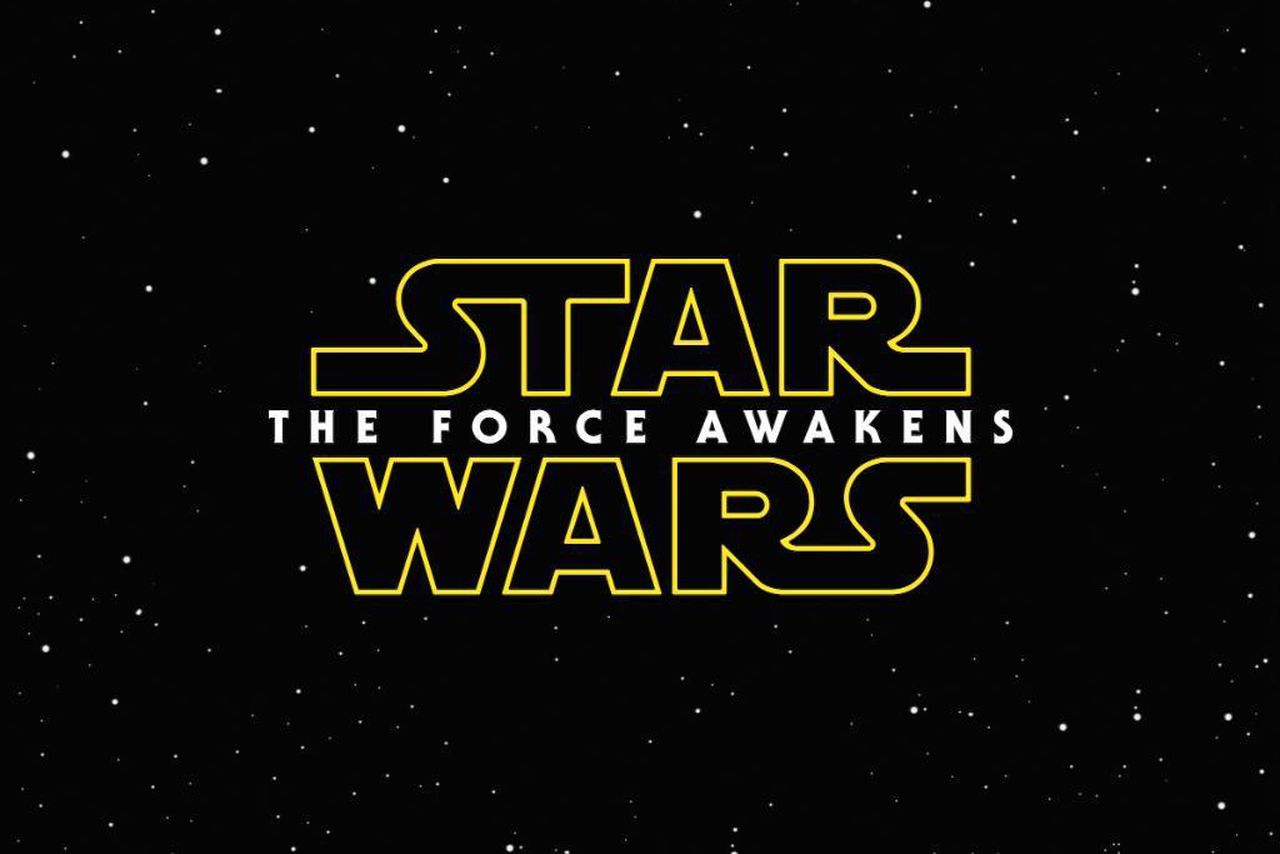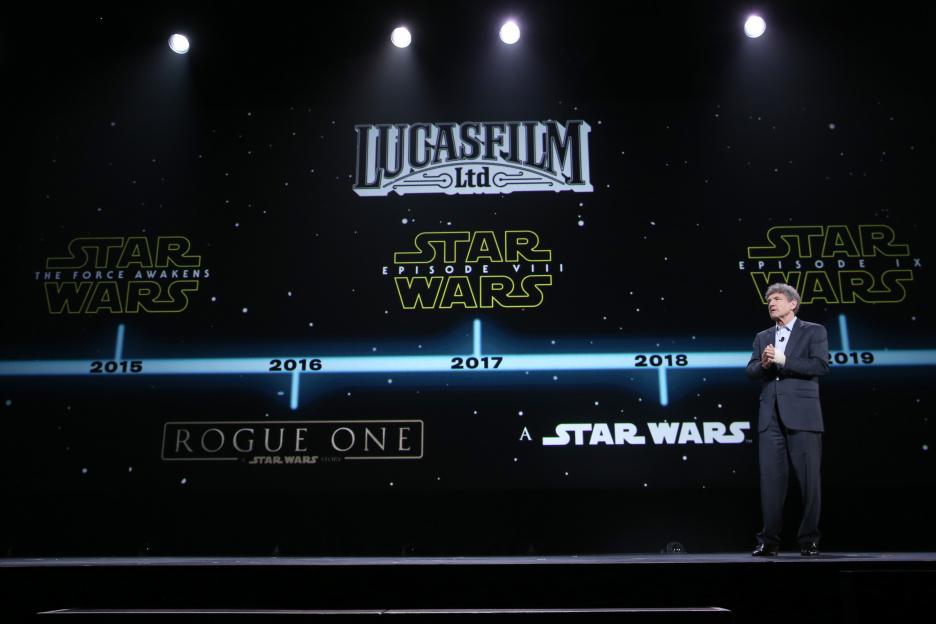Really, is there anything else I could
write about for my grand re-entry into the blogging world?
That's right. We're going to talk
about Star Wars: The Force Awakens.
 |
| *fanfare* (The film will now pause for ten minutes while the audience applauds wildly.) |
Although I could, of course I could,
I'm going to restrain myself from talking about the movie in relation
to the history of Star Wars; the prequels, the old Expanded Universe,
all those sorts of things. I absolutely will go into those issues at
some point, because good heavens is there ample fodder for discussion
there! But it feels appropriate to start with the movie, not as the
obliteration of nearly twenty-five years of continuity (that's right,
I count from the Thrawn Trilogy; suck it, Splinter of the Mind's
Eye!) or the rectification of the poor choices and missed
opportunities of the now-decade-old prequel trilogy, but as nothing
more or less than a movie in its own right. Because ultimately, it
has to stand and fall as that.
So, The Force Awakens. Is it any
good?
Honestly, it's so much better than it
had any right to be. In the hands of J.J. Abrams, who has turned in
not one but two disappointing Star Trek films, one of which
absolutely disappeared up its own ass in terms of ham-fisted
'fanservice', and backed by Disney, which is not exactly famous for
its bold risk-taking and willingness to move forwards rather than
just endlessly, pointlessly recycle the past (just apropos of
nothing, did you know 2016 will see live action productions of Mulan,
The Jungle Book and Beauty and the Beast, a sequel to Burton's Alice
in Wonderland, Finding Dory, and remakes of The BFG and Pete's
Dragon?), the latest entry in the Star Wars movie franchise could all
too easily have been an underwhelming and outdated retread of an
almost forty year old mythological moment. But for all that Abrams
and Disney have their weaknesses, they also have their strengths.
Abrams' failures with Star Trek were because he seemed to have his
heart set on doing a free-wheeling space adventure, which is exactly
what Star Trek isn't and Star Wars should be, and the quintessential
lesson Disney has learned from developing the Marvel Cinematic
Universe is the importance of steady brand development to maintain
reliable fan interest. The things that might have raised flags about
the trust behind this film are the very things that, I think, helped
ensure it's success.
 |
| Yeah, this? This was what we were afraid of. Just with more lens flare. |
But enough about the issues around the
film, let's talk about the film itself. Set just over thirty years
after Return of the Jedi, the Force Awakens centres around Finn, a
First Order stormtrooper desperate to escape the horrific conditions
of the imperial war machine, and Rey, a scavenger with an unclear
history and an affinity for language and piloting, along with Poe
Dameron, a hot-shot pilot and special agent for the fledgling
Resistance. The movie starts off beautifully, with an energetic
crawl and a great establishing shot, one of the new-model star
destroyers looming ominously into frame, and that moment really sets
the tone for what's to come. TFA is sharp, it's funny, and it
doesn't just have energy, it directs it appropriately.
Now, it can't be ignored that this
movie is very much stuffed with callbacks and fanservice moments.
Someone having 'a bad feeling about this', the dejarik table in the
Falcon reactivating, Vader's mask, Rey's Rebellion pilot helmet,
Ackbar, Nien Numb, the corridors of Cloud City, there are a multitude
of moments, big and little, that directly refer back to the events of
the original trilogy (although, aside from a single mention of clones
as an alternative military resource, I can't think of any prequel
trilogy references). There are also those who consider the film to
be simply a retread of A New Hope, and I suppose I can understand
their viewpoint. Stop me if you've heard this one before – an
isolated young person, living on a harsh desert planet, comes across
a droid full of secret military intelligence, the possession of which
leads them off-planet and into the company of a non-government
military organization trying to fight an 'evil empire', whose key
figureheads are a masked, black-clad Force user and a sharp-faced
British-accented naval officer, with the film ultimately culminating
in an assault on a planet-sized weapon of mass destruction.
But just because they share similar
ideas doesn't mean they're the same film, and TFA purposefully
remixes ANH to provide an updated, modern take on that original
introduction to the Star Wars galaxy, with the intention of
rekindling the same sort of excitement. It's a safe strategy,
certainly, one that trades on the comfort of updated familiarity
rather than taking bold risks with wild new directions. But I think
it definitely works, not least because while the movies share broad
stroke plot elements, the execution really could not be more
different. And that ultimately comes down to the characters.
 |
| Like these ones.... |
The trio of TFA (really, a duo with a
scene-stealing supporting member) is made up of pieces of the OT
trio, but blended and tweaked and mixed together into new wholes.
Finn is our everyman, a role shared by Luke and Han to varying
degrees in ANH, but you couldn't mistake him for either; he lacks
Han's killer edge, but isn't nearly so naive about the universe as
Luke. Rey is the isolated youngster on a desert world, but not only
does she not dream of adventure, as did her Skywalker predecessor,
she actively tries to return to her previous life, which is a rather
more Solo-esque trait. And while Poe has Han's smirk and daring-do
and Luke's skill in a cockpit, he's also Leia to some extent, needing
to be rescued, yes, but also attached to something bigger and more
dangerous than the other two. Each of them has elements of the
original trio, but because they're different people, in different
settings, with different experiences and histories, those traits get
a chance to bounce off one another in very different ways. You'd
never compare Han trying to suave up Leia with Finn stammeringly
asking if Rey has a boyfriend, a cute boyfriend.
But there's more to a movie than its
heroes; there are villains to consider, as well. Lord Snoke is
roughly as much of a cipher as the Emperor was during the first two
films, but that still leaves us with his villainous diumvirate.
Kylo Ren and General Hux stand in place of Darth Vader and Grand Moff
Tarkin, but again, both are very different characters. Hux lacks
Tarkin's assurance, tending to squabble with Ren as an equal rather
than presenting as a respectful superior, as Tarkin did, and seems
more inclined towards grand gestures and speeches, as compared with
Tarkin's quiet, brutal efficiency. Ren is the real standout, though,
a villain still growing into his role, acknowledged both in-unverse
and out of it, a threat just starting to take its full, awesome
shape. One can't help but feel that watching Ren's character arc
over the course of the trilogy is going to be every bit as
fascinating as whatever Finn and Rey might go through.
 |
| ... and these ones. And yeah, there's a reason Phasma's tiny, in the back. Sorry Phasma! |
So, with strong characters, characters
that are familiar but still distinct, still new and different, and
broad-stroke mythological elements remixed for a new generation, both
onscreen and in the theatre seats, the last question for The Force
Awakens would be presentation. After the blandness of the prequel
trilogy, which managed to be both unengagingly broad and
claustrophobicly narrow, it's a pleasure to say that TFA deserves
top marks here, as well. The emphasis on physical sets and props may
well have been a bit of a bit of a dig at Lucas, but it can't be said
it didn't work; the movie has a weathered, lived-in, real look to it
that harkens back to the original trilogy. Jakku, the Resistance
base, Maz Kinata's castle and the Starkiller Base and its surrounding
environs have a physicality that lets the actors really inhabit a
galaxy far, far away, though Abrams is of course happy to use CGI, as
any modern action-heavy scifi film-maker must be. The dogfight
scenes between TIEs and X-Wings are wonderful and frenetic, though
the apparently-fearsome rathtars never quite seem to break from the
'computer cartoon' view that robs them of some of their power. That
sequence could likely have done with some tightening up, and with at
least a few more physical props for the actors to work with. Still,
it's a relatively small failing in a film that otherwise mostly
avoids such things.
That's not to say that The Force
Awakens is perfect, of course. The movie's biggest flaw is simply
that it's not very good at exposition, in spite of having an opening
text crawl and not one but two everyman characters that can serve as
audience surrogates. Whereas A New Hope gave us a very simple
formula, The Force Awakens complicates things. It's hard for the
viewer to really sink into this aspect of the universe, since it's so
baffling trying to understand what the relationship is between the
various elements at play; the First Order is fighting the Resistance,
but launches its first major attack at the Republic, which is
supporting the Resistance, which can't be officially associated with
the Republic, which is for some reason not fighting the First Order?
Compared with that, A New Hope's contrast between brave Rebels and
the evil Galactic Empire is a model of perfect simplicity, giving the
fewer everything they need to think they understand what they're
seeing in just two phrases. While the tight focus on the central
characters works wonderfully, it does leave the wider galaxy
something of a question mark.
 |
| Also, like, does this thing move or what? |
Still, this is a problem that can be
solved easily enough in the coming films, and of course the
supplementary material is only too happy to go into beautifully
intricate detail about the sociopolitical tensions of made-up states.
But as Chuck of SF Debris so succinctly puts it, you don't get
credit for things you didn't put in the movie, because you didn't put
them in the movie!
So, the film does have flaws,
certainly. But nothing is perfect; to expect such would be the
height of foolishness. The important thing is that the film has
strong characters with varying interactions, sharp visuals,
well-plotted action scenes and appropriately deployed humour. It's a
wonderful reintroduction to a much-loved universe, but it also stands
on its own, as the first introduction for a whole new generation of
Star Wars fans.
The saga continues....
 |
| And continues, and continues, and.... |
No comments:
Post a Comment